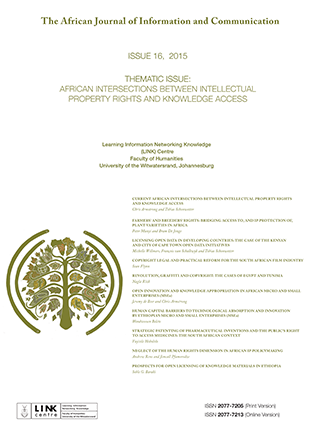Copyright Legal and Practical Reform for the South African Film Industry
DOI:
https://doi.org/10.23962/10539/19313Keywords:
copyright, limitations and exceptions, filmmaking, fair dealing, fair use, South Africa, user rightsAbstract
Copyright's interest in promoting creative production is often described as requiring a "balance" between exclusion and access rights. Owners of copyright receive exclusive rights to control copies of their works, which enables authors to earn returns on their creations through sales or licensing transactions. But as important to promoting creation are the user rights in copyright law which permit building on the work of predecessors. The necessity for balance in order to promote creation is clearly evident in the documentary film industry, where producers rely on copyright ownership to facilitate the dissemination of their works through broadcasters and other distributors, and on user rights to incorporate excerpts of other copyrighted material in their work. This article draws on a collaborative South African research project that has been working since 2008 to document influences of copyright law on the production of documentary films. The results of that research, summarised in the first part of the article, show that South African filmmakers are hampered by a legal environment that denies them copyright ownership in the majority of their projects while also denying them adequate rights to use, in their own works, elements of the works of others. The second part of the article describes capacity-building approaches and legal reforms that could be advantageous to the local film industry.
References
Association of Independent Video and Filmmakers, Independent Feature Project, International Documentary Association, National Alliance for Media Arts and Culture, Women in Film and Video, Washington, D.C. Chapter. (2005). Documentary filmmakers’ statement of best practices in fair use. Issued 18 November, in consultation with Center for Social Media (CSM) and Program on Information Justice and Intellectual Property (PIJIP), American University, Washington, DC. Retrieved from http://www.centerforsocialmedia.org/files/pdf/fair_use_final.pdf
Aufderheide, P., & Jaszi, P. (2004). Untold stories: Creative consequences of the rights clearance culture for documentary filmmakers.Washington, DC: American University. Retrieved from http://www.cmsimpact.org/sites/default/files/UNTOLDSTORIES_Report.pdf
Aufderheide, P., & Jaszi, P. (2011). Reclaiming fair use: How to put balance back in copyright. Chicago: University of Chicago Press. https://doi.org/10.7208/chicago/9780226032443.001.0001
Berne Convention for the Protection of Literary and Artistic Works (1886).
Birnhack, M. (2003). Acknowledging the conflict between copyright law and freedom of expression under the Human Rights Act. Entertainment Law Review, 2003, 24-34. Campbell v. Acuff-Rose Music, 510 U.S.US 569 (1994). https://doi.org/10.2139/ssrn.368961
Chevalier, J. M., & Buckles, D.J. (2013). Participatory action research: Theory and methods for engaged inquiry. London: Routledge.Commonwealth of Australia (1968). Copyright Act 63 of 1968. https://doi.org/10.4324/9780203107386
Department of Trade and Industry (DTI). (2013). Draft national policy on intellectual property, 4 September. Pretoria: Government of South Africa. Retrieved from http://ip-unit.org/wp-content/uploads/2013/09/DRAFT-IP-POLICY.pdf
Department of Trade and Industry. (2015). [draft] Copyright Amendment Bill 2015. Government Gazette No. 39028, 27 July. Retrieved from http://www.thedti.gov.za/gazzettes/Copyright_Amendment_Bill.pdf
Eldred v. Ashcroft, 537 U.S. 186 (2003).
Flynn, S., & Jaszi, P. (2009). Untold stories in South Africa: Creative consequences of the rights-clearing culture for documentary filmmakers. PIJIP Research Paper No. 20. Retrieved from http://digitalcommons.wcl.american.edu/research/20/
Flynn, S. (2015). Joint Academic Comments on the South African Copyright Amendment Bill, 2015, (with Jonathan Band, Brandon Butler, Peter Jaszi, Caroline Ncube, Denise Nicholson, Andrew Rens, Tobias Schonwetter, Rebecca Tushnet, Coenraad Visser), 16 September. Retrieved from http://infojustice.org/archives/35003
Geiger, C., Gervais, D. J., & Senftleben, M. (2014). The three-step-test revisited: How to use the test’s flexibility in national copyright law. American University International Law Review, 29(3).Jamaica. (1993). The Copyright Act 5 of 1993.
Jaszi, P. (2005). Public interest exceptions in copyright: A comparative and international perspective. Retrieved from http://correctingcourse.columbia.edu/paper_jaszi.pdf
Laugh It Off Promotions CC v South African Breweries International (Finance) BV t/a Sabmark International and Another (CCT42/04) [2005] ZACC 7; 2006 (1) SA 144 (CC); 2005 (8) BCLR 743 (CC) (27 May 2005).
Leval, P. N. (1990). Toward a fair use standard. Harvard Law Review, 103, 1105. https://doi.org/10.2307/1341457
Mkhabela Huntley Adekeye, & Spoor and Fisher. (2008). Unlocking the creative and economic potential of the South African television sector – recommendations for legal, regulatory and commissioning practice changes: Report to the South African Broadcasting Corporation, Independent Producers Organisation and the South African Screen Federation. Johannesburg: Mkhabela Huntley Adekeye Inc. and Spoor and Fisher Attorneys.
Okediji, R. L. (2006). The international copyright system: Limitations, exceptions and public interest considerations for developing countries. Issue Paper No. 15, International Centre for Trade and Sustainable Development (ICTSD) and UN Conference on Trade and Development (UNCTAD). https://doi.org/10.7215/IP_IP_20060601
Program on Information Justice and Intellectual Property (PIJIP). (2012a). Appendix II: Examples of flexible limitations and exceptions from existing and proposed laws. American University Washington College of Law. Retrieved from http://infojustice.org/wp-content/uploads/2012/12/Appendix-II.pdf
PIJIP. (2012b). Masterlist: Excerpts of representative copyright limitations and exceptions, 26 November. American University Washington College of Law. Retrieved from http://infojustice.org/wp-content/uploads/2013/08/Masterlist-11262012.pdf
Reason, P., & Bradbury, H. (Eds.). (2008). The Sage handbook of action research: Participative inquiry and practice. Thousand Oaks, CA: Sage. https://doi.org/10.4135/9781848607934
Republic of South Africa. (1978). Copyright Act 98 of 1978, as amended up to Copyright Amendment Act 9 of 2002. Retrieved from http://www.wipo.int/wipolex/en/text.jsp?file_id=130429
Republic of South Africa. (2002). Electronic Communications and Transactions Act 25 of 2002.Samuelson, P. (2009). Unbundling fair uses. Fordham Law Review, 77, 2537-2621.
Shuttleworth Foundation (2010). Report on the South African open copyright review. Retrieved from http://ip-unit.org/wp-content/uploads/2010/07/opencopyrightreport1.pdf
United States Congress. (1976). Copyright Act, as amended. 17 U.S.C. §§ 101-810.
Downloads
Published
Issue
Section
License
Copyright (c) 2015 https://creativecommons.org/licenses/by/4.0

This work is licensed under a Creative Commons Attribution 4.0 International License.
How to Cite
- Abstract 340
- pdf 224


.png)